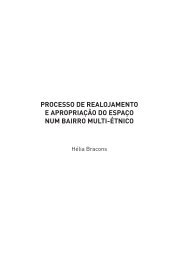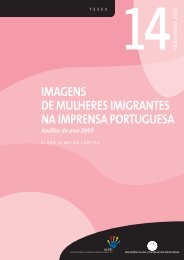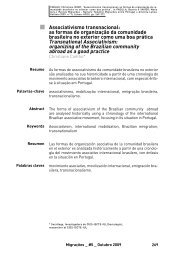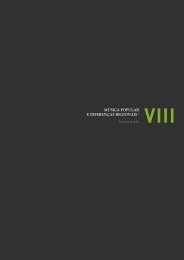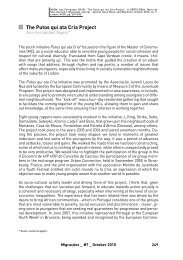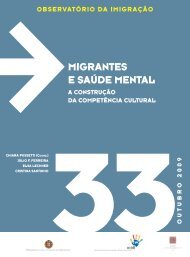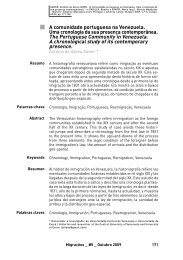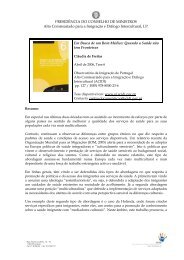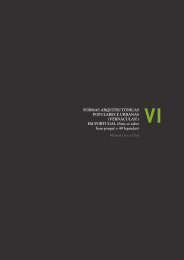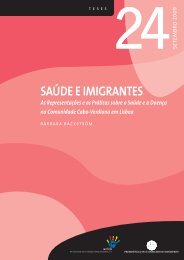Revising citizenship: migration and fado in the play of identities in ...
Revising citizenship: migration and fado in the play of identities in ...
Revising citizenship: migration and fado in the play of identities in ...
Create successful ePaper yourself
Turn your PDF publications into a flip-book with our unique Google optimized e-Paper software.
“One needs to be mature <strong>in</strong> order to really underst<strong>and</strong> <strong>fado</strong>. You have to have had a grief ora deep sorrow <strong>in</strong> your life, ano<strong>the</strong>r woman <strong>in</strong> your life, you know, love displeasure, or someth<strong>in</strong>g<strong>of</strong> that sort.” (Antónia, personal <strong>in</strong>terview, Newark, 24.11.1990, <strong>in</strong> Carvalho, 1991:33).One <strong>of</strong> <strong>the</strong> most <strong>of</strong>ten heard <strong>fado</strong>s dur<strong>in</strong>g my fieldwork, was Negro Ciúme (gloomyjealousy). Asked about this preference, fadistas stressed that <strong>the</strong> more <strong>the</strong> <strong>fado</strong> was<strong>in</strong>timately felt, <strong>the</strong> better it was performed <strong>and</strong> understood. The emotional aspect <strong>of</strong><strong>fado</strong> had, <strong>the</strong>y stressed, a strong <strong>in</strong>fluence <strong>in</strong> <strong>the</strong> learn<strong>in</strong>g process as well:“Fado can’t be taught. It is <strong>the</strong>re or it is not <strong>the</strong>re at all. Fado is a way <strong>of</strong> life, it is an emotionalstate.” (Conceição Antunes, personal <strong>in</strong>terview, Newark, 24.11.1990, <strong>in</strong> Carvalho, 1991:33).The heavily emotional <strong>the</strong>mes <strong>of</strong> jealousy <strong>and</strong> unrequited love, so common <strong>in</strong> thiscontext, are effective for connections <strong>of</strong> m<strong>in</strong>d <strong>and</strong> body <strong>and</strong> <strong>in</strong>timate <strong>and</strong> public spheres<strong>of</strong> <strong>the</strong> identity expression <strong>in</strong> performance. Such expression is noted <strong>in</strong> literary <strong>and</strong>musical text references as well as on visible <strong>and</strong> audible components. Add<strong>in</strong>g <strong>the</strong>palatal ones from <strong>the</strong> respective d<strong>in</strong>ners one may th<strong>in</strong>k about <strong>the</strong> completeness <strong>and</strong>power <strong>in</strong>volved <strong>in</strong> <strong>the</strong> behaviour <strong>and</strong> sensations <strong>of</strong> this complex symbol <strong>of</strong> Portuguese<strong>citizenship</strong> representation.Although most <strong>fado</strong>s <strong>in</strong> <strong>the</strong> community were sad, related with depress<strong>in</strong>g aspects <strong>of</strong>life, <strong>and</strong> with <strong>the</strong> category <strong>of</strong> <strong>fado</strong> itself, <strong>the</strong>re were less heavy ones referr<strong>in</strong>g to <strong>the</strong>status <strong>of</strong> be<strong>in</strong>g a migrant, however sung with <strong>the</strong> nostalgia <strong>of</strong> be<strong>in</strong>g far from homel<strong>and</strong>.F<strong>in</strong>ally, some Lisbon related songs completed <strong>the</strong> repertoire. Though sung <strong>in</strong><strong>the</strong> same performance context, <strong>the</strong>se were classified as marchas populares (popularmarches) by some participants. In contrast with <strong>the</strong> o<strong>the</strong>r <strong>fado</strong>s, <strong>the</strong>se songs are <strong>in</strong>a regular <strong>and</strong> fast tempo <strong>and</strong> usually <strong>in</strong> a major key. The participants’ dist<strong>in</strong>ctionbetween <strong>the</strong> music categories – <strong>fado</strong>s <strong>and</strong> marchas populares – was not alwaysclear. On asked about this, one musician told that marchas were “<strong>the</strong> happy <strong>fado</strong>s”(Fern<strong>and</strong>o Costa, personal <strong>in</strong>terview, Newark 13.04.1990). This op<strong>in</strong>ion was howeverrefuted by o<strong>the</strong>rs who ma<strong>in</strong>ta<strong>in</strong>ed <strong>fado</strong> was <strong>in</strong>herently sad. Although <strong>the</strong>re were new<strong>fado</strong> texts <strong>in</strong> <strong>the</strong> community, <strong>the</strong>y were also sad. The majority <strong>of</strong> <strong>the</strong> repertoire wasold texts sung to old music patterns, <strong>in</strong> tune with <strong>the</strong> “emotional state” that characterized“a way <strong>of</strong> life” which <strong>the</strong>y called “typically Portuguese”.What to th<strong>in</strong>k <strong>the</strong>n about <strong>the</strong> exuberant happ<strong>in</strong>ess <strong>and</strong> excitement <strong>of</strong> <strong>the</strong> same group<strong>of</strong> people, at <strong>the</strong> same event, <strong>the</strong> Portuguese Night, dur<strong>in</strong>g <strong>the</strong> <strong>fado</strong> session dance <strong>in</strong>termissions?Was this <strong>in</strong> tune with <strong>the</strong> expressed typically Portuguese way <strong>of</strong> be<strong>in</strong>g?Were <strong>the</strong>y thus less Portuguese, <strong>in</strong> <strong>the</strong>se danc<strong>in</strong>g <strong>in</strong>termissions, than <strong>in</strong> <strong>the</strong> sung<strong>fado</strong> sessions? Lambada fever, already present for some time <strong>in</strong> New York where I lived,heard loud from cars on Broadway, <strong>and</strong> from Lat<strong>in</strong> stores, had been enhanced by<strong>the</strong> release <strong>of</strong> two films: Lambada <strong>and</strong> The Forbidden Dance directed by Joel Silberg<strong>and</strong> Greydon Clark respectively, on 18.03.1990. The films, Jon Pareles noted <strong>the</strong>n <strong>in</strong>The New York Times, had <strong>in</strong> common, not only <strong>the</strong> promotion <strong>of</strong> <strong>the</strong> hot lambada asAmerican dance music, but also to do so as a cry <strong>of</strong> protest aga<strong>in</strong>st <strong>the</strong> anti-Mexicanprejudice <strong>in</strong> Los Angeles (1990). The song had already been translated <strong>in</strong>to 42 idioms<strong>and</strong> <strong>the</strong> “dance craze, <strong>in</strong>volv<strong>in</strong>g undulat<strong>in</strong>g, bik<strong>in</strong>i-clad rumps <strong>and</strong> female-gro<strong>in</strong>-to-Migrações _ #7 _ October 201079



